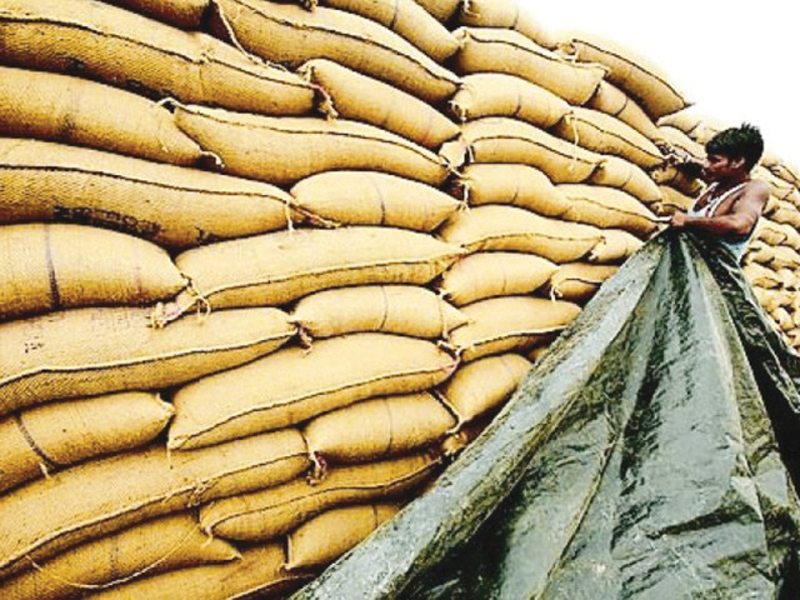
The area had, however, no shortage of wheat. Thousands of bags filled with wheat, stored in government warehouses in the area, waited for notification of a government official, but in vain. That it took the erstwhile deputy commissioner to take notice after a lapse of three months, and our media to notice this gross negligence after another two months have masked the real systematic cause of the crisis: the government control.
Why the government had to procure and store wheat in its warehouses for a long time only to be released after a notification?
What would happen if the same wheat stock was available with private warehouses and what action would they have taken in a condition of drought and food shortage?
In other words, how results of an official signature would have varied from a market signal?
I will show how responses of the ‘political society’ including politicians, bureaucrats and judiciary would differ from that of the ‘civil society’ including private businesses and private buyers.
Here is what the political society has done so far.
The Sindh government has announced establishing the Thar Development Corporation to cope with the drought-like situation in the district. Thus, the state has expanded.
The chairman of the PPP, currently ruling the Sindh province, instead of being critical of its government, came up with this statement: “My sons haven’t brought drought in Tharparkar as the media reports. Why don’t the media take names of Arbabs, Shah Mehmood and Pir Pagaro’s supporters, who also get elected from Tharparkar?”
The courts have swung into action. The Sindh High Court’s monitoring team, led by Tharparkar’s senior civil judge, has raided depots in Islamkot and Diplo, and deemed the distribution process slow. The judge has asked the media to inform his team of reports of negligence or corruption by government servants involved in the relief process.
Let me narrate this “system”. To solve the problem of lack of access to and distribution of wheat, our collective conscience has devised an ingenious solution: politicians are leading the process of wheat distribution, bureaucrats are assisting them, judges are inspecting the food depots, and media is watching the distribution. Is there something odd in this equation, which otherwise is a simple exchange of commodities?
Market role
Where is the market, usually considered selfish and sinful, in this puzzle?
To understand the role of market in shortages, whether caused by an actual shortfall in production or a short supply in distribution, consider two agents: the consumer or buyer of wheat and seller or the middleman ‘hoarding’ wheat.
Here is what a victim of the drought and food shortage, our consumer, said while talking to a newspaper, “we aren’t beggars.” He said: “We can work and earn for our children. How much and for how many days will we be given food?”
Naroo, a resident of village Lonyar, who was preparing to move to Nawabshah, refusing to rely on relief support, said: “We’ll come back within two months with sufficient wheat and cash to last us for a while.”
This is the typical response of locals, those industrious, dignified and self-respecting citizens. They are willing to do work and earn their living instead of begging the politicians, who in any case, spend taxpayers’ money for charitable media sessions.
The middlemen, unfortunately infamous for ‘hoarding’, do a great service. They accumulate goods when they are plenty, and cheap; and sell them when they are short, and hence dear. Thus they stabilise flow of goods. This is exactly what would have happened if wheat was available with the markets of Tharparkar instead of being locked up in government warehouses, waiting for the official signature instead of market signal.
No doubt, the goods would have become expensive, but at least they would have been available. The industrious citizens would have bought it, may be on credit, and some would have obtained it with the support from altruistic institutions of our civil society, including the likes of Edhi. Wheat would have eventually reached where it was needed the most.
Amartya Sen has famously argued that famines do not happen in democracies. He is wrong: democracies can easily fall to famines if markets are not present.
The author is founder and Executive Director of PRIME Institute, a public policy think tank based in Islamabad
Published in The Express Tribune, April 7th, 2014.
Like Business on Facebook, follow @TribuneBiz on Twitter to stay informed and join in the conversation.
COMMENTS (7)
Comments are moderated and generally will be posted if they are on-topic and not abusive.
For more information, please see our Comments FAQ

1732569774-0/Baymax-(2)1732569774-0-165x106.webp)















The involvement of politicians and bureaucrats can simply be explained by their sole purpose: profit making through rent seeking. And this would pretty much explain why they are present in every sector of the economy and every aspect of our lives. The opportunities for arbitrage are too good (and too big) to be missed. This becomes all the easier when an individual is in a decision making position. Otherwise, as the author has rightly asked, why would the government need to procure wheat? There is no logic at play here, but only politics! The rationale for procurement lies in the distribution of wealth to the large landlords who grow wheat on their fields. This policy used to be a hallmark of PPP, but its now becoming true of even PML(N).
The great thing about markets is that they are a good leveler. The price signals leading to resource allocation are as much in the grasp of a poor resident of Thar as of a wadera. If market principles had prevailed, i am pretty sure we wouldn't have been watching a tragedy like Thar unfold in front of our eyes. But since none of our political parties/decision makers seems to give any credence to the working of the markets (i personally believe they lack the intellectual capacity to understand the nature and working of markets), future tragedies like Thar will always remain a real possibility.
Note: One of the comments cast doubt on whether markets could have saved Thar from tragedy. Well, look no further than California. Its been suffering a severe drought recently (due to lack of rainfall), yet never has there been any shortage of food or other commodities. But i can assure the reader that if there were a 'competent authority' whose 'approval' was needed, California would have suffered the same fate as Thar.
@Sarmad: If you read the statements from the locals, they have not complained lack of money. They have expressed eagerness to earn money but where they can buy if wheat is all locked up?
@amar: If we do not take tough economic decisions, parasites like PASCO will continue to grow. We really need to trust the selfishness of market here! For their own interest, they will store, and for their own interest, they will sell.
@Ruby: When you mention collusion etc, it means my condition of "presence of market" is not met. Presence of markets essentially mean no or very minimal collusion. Monitoring of prices or stocks assume efficient government officials, which is not the case. Plus price stabilization is not a government function, and if EU or US is doing it, we should not repeat their errors. They are not our benchmarks.
@amar:
Devolve to provinces and then districts?
I agree with what the author has to say. But now there is a very big problem. PASCO has become too big, influential and entrenched to disband overnight. How does the author propose this be done?
Nicely written...........to call the present dispensation a democracy is a misnomer, its more a SHAM democracy and in saying so I am being gracious.
The writer wrote like a true libertarian. May be markets would have done better than government in this particular instance. But fantasizing that markets are the best distributors is not responsible behaviour. Markets also hoard, collude and given a free rein, tend towards monopoly. Instead if there is a transparent weekly update on stocks in government godowns, officials can be ready to deal with circumstances like this. We simply cannot trust markets on essential commodities.
The problem with Thar is not that the "wheat" is not available. The problem with them is that they dont have money to buy wheat. If you even "liberalize" wheat trading, even than this famine problem in Thar will not end. Every govt. in every country interfere in market to keep prices stable whether be it in wheat or corn or milk or etc. So what's the problem when the same trend is followed by Pak govt?